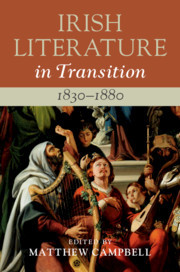L’édition demandée n’est plus disponible, nous vous proposons la dernière édition.
Irish Literature in Transition, 1830–1880: Volume 3 Irish Literature in Transition Series
Langue : Anglais
Coordonnateur : Campbell Matthew

This volume is a rich, innovative volume on emergent Irish literary forms in the Victorian age.
Ireland's experience in the nineteenth century was quite different from that of Victorian Britain. Its fictions were written in differing forms ? like the gothic or historical novel ? and its poetry and drama were populated with ballad and song. Its writers were by turns nationalist or unionist, anglophile or de-anglicising. If the effects of famine and emigration were catastrophic for mid-nineteenth-century Irish culture, they initiated a literary story that spread across the diaspora. Despite the decline of spoken Irish, literature continued to be published, while scholarly endeavours such as translation or the Ordnance Survey preserved much from the Gaelic past. This rich volume examines the many forms of new writing that thrived throughout this period. Utilizing a thematic and historical approach, it addresses a broad anglophone readership in Victorian literature. Essays consider the Irish authors in America and India, women's writing, and the resilience of Irish literature before the revival.
Part I. Contexts and Contents: Politics and Periodicals: 1. Victorian Ireland, 1830–1880: a transition state Matthew Campbell; 2. Satire, fiction and innovation between Dublin, Edinburgh and London Jim Kelly; 3. Young Irelanders, Fenians, Land Leaguers: Young Ireland and beyond Melissa Fegan; Part II. Ireland and the Liberal Arts and Sciences: 4. Naming the place: the Ordnance Survey and its afterlives Cóilín Parsons; 5. Political economy? The economics and sociology of famine Marguerite Corporaal; 6. Newman's Irish University Colin Barr; 7. The charms of Ireland: travel writing and tourism Glenn Hooper; Part III. From the Four Nations to the Globalising Irish: 8. England and Ireland, Tory and Whig: Thackeray, Trollope, Arnold John McCourt; 9. The Irish in the Empire: Moore, Lever, Duffy Jim Shanahan; 10. An exiled history: Mitchel to O'Leary James Quinn; 11. The writing of Irish-America Peter D. O'Neill; Part IV. The Languages of Literature: 12. Antiquarians and authentics: survival and revival in Gaelic writing Nicholas Wolf; 13. Poetry and its audiences: club, street, ballad Norman Vance; 14. Gothic, allegory, realism: the Irish 'Victorian' novel Raphael Ingelbien; 15. The rise of the woman writer Anna Pilz; 16. Dion Boucicault and the globalized Irish stage Shaun Richards; 17. The popular prints Stephanie Rains.
Matthew Campbell is Professor of Modern Literature at the University of York. He is the author of Rhythm and Will in Victorian Poetry (1999) and Irish Poetry Under the Union (2013). He is also the editor of the Cambridge Companion to Contemporary Irish Poetry (Cambridge, 2003) and The Voice of the People; the European Folk Revival (2012).
Date de parution : 03-2020
Ouvrage de 340 p.
16x23.5 cm
Thème d’Irish Literature in Transition, 1830–1880: Volume 3 :
© 2024 LAVOISIER S.A.S.



